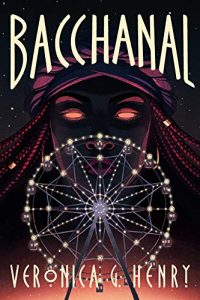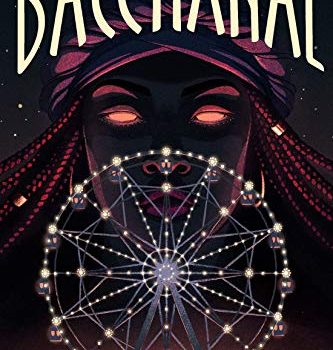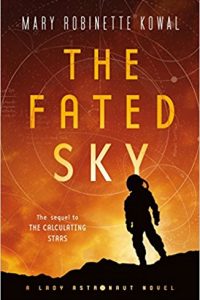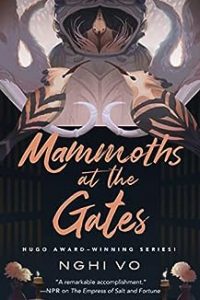Alex Brown Reviews Bacchanal by Veronica G. Henry
 Bacchanal, Veronica G. Henry (47North 978-1542027816, $24.95, 352pp, hc) June 2021.
Bacchanal, Veronica G. Henry (47North 978-1542027816, $24.95, 352pp, hc) June 2021.
In her debut historical fantasy novel Bacchanal, Veronica G. Henry takes readers on a tour of the Depression-era American south and southwest. In Louisiana, lonely Eliza Meeks encounters the mostly all-Black carnival as it comes to her town. With no prospects, no family, and no money, joining the carnival may be her only chance at independence. Clay, the apparent leader of the carnival, takes her on and sets her to work with the bedraggled animals that live in the tiny zoo. The job suits her well, as she can secretly communicate with animals. Most of the creatures she’s tried to connect to telepathically have died, but Eliza is nothing if not determined to figure out how to turn her curse into a gift.
As the days turn into weeks, and the weeks turn into months, Eliza settles in. For the first time in her life, she has friends and lovers. She has long-term goals and real responsibilities, and although she is far from rich, she is making her own money using her talents for the first time in her life. Yet something is amiss in the carnival. Children go missing from every town they pass through, and carnies who don’t pull their weight disappear or turn up dead. It all comes back to the strange red wagon at the heart of the Bacchanal Carnival. Something dark and terrible lives in that wagon, something that is hunting its enemies and devouring souls.
Bacchanal contains two plots that function largely independently until the final act. One story is Eliza’s, wherein a young woman discovering herself and her powers must risk everything to protect those she cares for. The other story belongs to the main antagonist of the piece: Ahiku, the ancient demon who controls the carnival. Ahiku uses the carnival as a cover to track down those who oppose her and pose a threat to her plans, as well as to find fresh, young souls to consume. Through bribery and blackmail, she pulls together servants and soldiers to do her bidding. Two Dahomey warriors guard her wagon and enforce her edicts, an Eloko acts as her eyes and ears about the camp, and Clay keeps the scam running by bringing in new recruits and disposing of the corpses of her victims. Some choose to fight alongside the demon, while others are there because they believe they have no choice.
Henry’s choice of setting gives her a lot of room to explore her premise. The Depression hit Black and white folks differently. By 1939 when the novel is set, much of President Franklin Delano Roosevelt’s New Deal programs and policies were in full swing. However, an overwhelming majority of Black Americans were intentionally blocked from accessing most of the New Deal’s benefits. Whatever success they found was often in spite of the restrictions placed on them. That’s part of what draws Eliza to the Bacchanal Carnival, which features mostly Black performers, an unusual setup for the period. Real historical figures make appearances as well. From Stephanie ‘‘Queenie’’ St. Clair, a Black woman of French descent who went from New York crime boss to civil rights advocate, to the Sutton family, prominent San Antonian entrepreneurs and educators, Henry touches on the known and lesser known.
Unfortunately, the book as a whole doesn’t quite live up to the high water mark of its premise. The constant diversions into side characters didn’t work for me. Many of these chapters are about people who are introduced solely so we can witness their painful, drawn-out deaths at the hands of Ahiku. Other chapters offer peeks into the histories of some of the carnies Eliza works with. Few added much to the story or character development. Whatever tension Henry was building up drained with each side trip. Although these stories were interesting enough as standalones, the sheer volume and frequency of them disrupted the pacing. Instead of progressive intensity, the momentum would start and stop, start again and stop again.
The narrative wasn’t helped by Henry frequently pulling back at moments of potential conflict or not following through with a cool concept. Too often, when I expected a confrontation, the event would fizzle out into nothing. Creatures and characters who offered intrigue and excitement ended up having hardly any effect on the main plot, despite their seeming importance. Much of what enticed me in the beginning became little more than window dressing by the end – including the haphazard, underdeveloped love triangle.
Structural issues notwithstanding, Bacchanal is entertaining. The atmosphere and worldbuilding crackle with energy and the characters are captivating in unique ways. Veronica G. Henry deftly weaves early twentieth century Black history together with West African mythology. There is a lot of interesting world to explore here, enough that Henry could easily dip back in for another novel or two if she wanted to, and I’m looking forward to what she comes up with next.
This review and more like it in the October 2021 issue of Locus.
 While you are here, please take a moment to support Locus with a one-time or recurring donation. We rely on reader donations to keep the magazine and site going, and would like to keep the site paywall free, but WE NEED YOUR FINANCIAL SUPPORT to continue quality coverage of the science fiction and fantasy field.
While you are here, please take a moment to support Locus with a one-time or recurring donation. We rely on reader donations to keep the magazine and site going, and would like to keep the site paywall free, but WE NEED YOUR FINANCIAL SUPPORT to continue quality coverage of the science fiction and fantasy field.
©Locus Magazine. Copyrighted material may not be republished without permission of LSFF.







